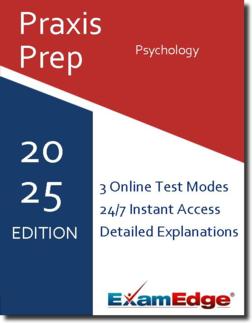Praxis Psychology (5391) Practice Tests & Test Prep by Exam Edge - Topics
Based on 32 Reviews
- Real Exam Simulation: Timed questions and matching content build comfort for your Praxis Psychology test day.
- Instant, 24/7 Access: Web-based Praxis Psychology practice exams with no software needed.
- Clear Explanations: Step-by-step answers and explanations for your Praxis exam to strengthen understanding.
- Boosted Confidence: Reduces anxiety and improves test-taking skills to ace your Praxis Psychology (5391).

Understanding the exact breakdown of the Praxis Psychology test will help you know what to expect and how to most effectively prepare. The Praxis Psychology has 120 multiple-choice questions The exam will be broken down into the sections below:
| Praxis Psychology Exam Blueprint | ||
|---|---|---|
| Domain Name | % | Number of Questions |
| Methods, Approaches, Ethics, and Assessment | 17% | 20 |
| Biopsychology, Sensation and Perception, and States of Consciousness | 16% | 19 |
| Life Span Development and Individual Differences | 12% | 14 |
| Learning, Memory, and Cognition | 16% | 19 |
| Personality, Social Psychology, Motivation and Emotion, and Stress | 23% | 28 |
| Psychological Disorders and Treatment | 16% | 19 |


